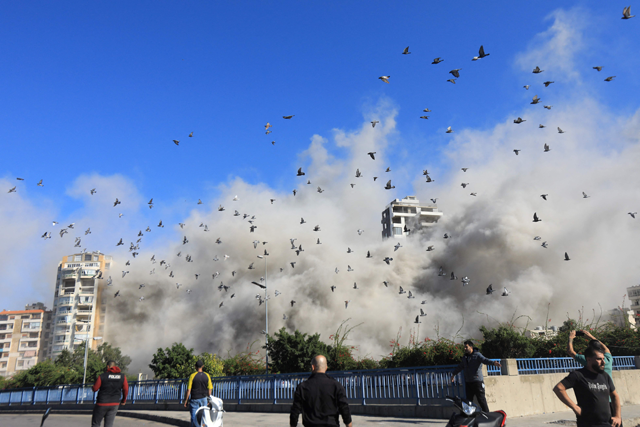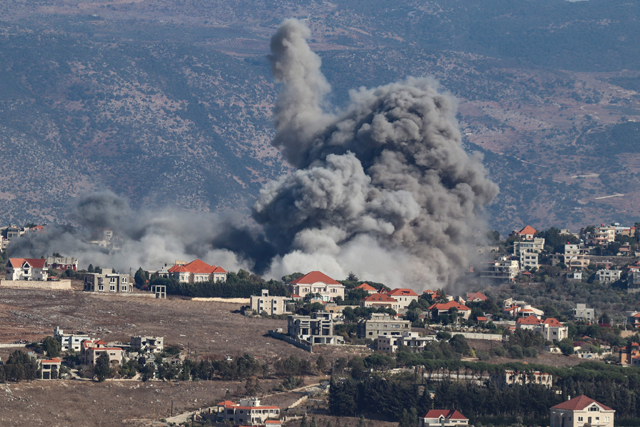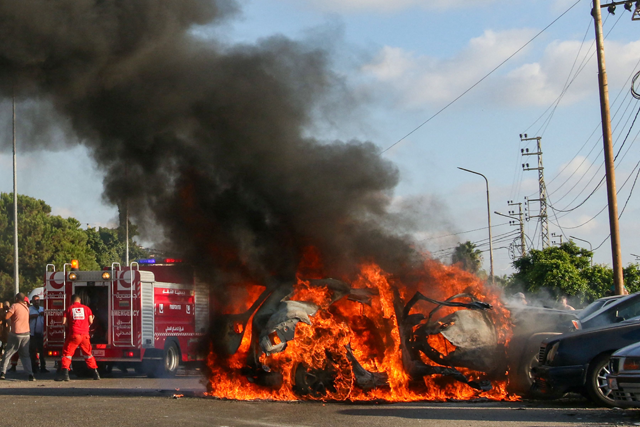You are here
Schools closed in Beirut after deadly Israeli air raid
By AFP - Nov 18,2024 - Last updated at Nov 18,2024
BEIRUT, Lebanon — Schools in Beirut were closed on Monday after rare strikes on central districts of the Lebanese capital killed six people including Hizbollah's spokesman, the latest senior figure slain by Israel.
Israel escalated its bombardment of Hizbollah strongholds in late September, vowing to secure its northern border with Lebanon to allow Israelis displaced by cross-border fire to return home.
Sunday's strikes hit densely populated districts of central Beirut that had so far been spared the violence engulfing other areas of Lebanon, including Hizbollah's largely emptied bastion in the city's southern suburbs.
Six people were killed in two separate strikes, according to the Lebanese health ministry, including Hizbollah media relations chief Mohammed Afif, the group said.
Israel's military confirmed it had carried out the strike that killed Afif, but did not comment on a second attack in central Beirut.
"In a quarter of an hour our whole life's work was lost," said Shukri Fuad, whose shop was destroyed in the second strike that hit a busy shopping district, sparking a huge blaze.
Lebanon's National News Agency (NNA) said the fire had largely been extinguished by Monday morning, noting it had caused diesel fuel tanks to explode.
The strikes prompted the education ministry to shut schools and higher education institutions in the Beirut area for two days.
Heba, a teacher who has already moved classes online, said the school closure was "normal, we Lebanese are used to it".
"But we don't understand how this whole situation is going to end," said the 44-year-old, who only gave her first name.
"You could be at home and get bombed... There's no longer any safe areas."
Children and young people around Lebanon have been heavily impacted by the war, which has seen schools around the country turned into shelters for the displaced.
Hizbollah spokesman buried
Israel widened the focus of its war from Gaza to Lebanon in late September, nearly a year into the conflict in Gaza that was sparked by Hamas's October 7, 2023 attack.
In support of its Palestinian ally, Hizbollah launched low-intensity strikes on Israel after the attack, forcing tens of thousands of Israelis to flee their homes.
With Hamas weakened but not crushed, Israel escalated its battle against Hizbollah, vowing to fight until victory.
Lebanese authorities say more than 3,480 people have been killed since October last year, with most casualties recorded since September.
Israeli strikes have killed senior Hizbollah officials including its leader Hassan Nasrallah in late September.
The group's spokesman Afif, who was laid to rest on Monday in the southern city of Sidon, was part of Nasrallah's inner circle and one of few Hizbollah officials to engage with the press.
The NNA reported new strikes early Monday on locations around south Lebanon, long a stronghold of Hizbollah.
Israel's military told AFP it had hit more than 200 targets in Lebanon over 36 hours, including in Beirut's southern suburbs, Hizbollah's main bastion.
On Monday, the army said dozens of projectiles were fired from Lebanon into northern Israel, with the country's air defence system intercepting some of them.
Lebanon last week said it was reviewing a US truce proposal in the Israel-Hizbollah war, as a Hamas official said the group was ready for a ceasefire in Gaza.
So far, however, there has been no sign of the wars abating.
The Israeli military kept up its campaign in Gaza over the weekend, where civil defence rescuers said strikes on Sunday killed dozens of people.
'Smoke, dust and chaos'
Israel on October 6 began a major offensive in northern Gaza, vowing to stop Hamas from regrouping there.
Gaza's civil defence agency said 34 people were killed and dozens more feared buried under the rubble after an Israeli air strike on Sunday hit a five-storey residential building in Beit Lahia in the north.
Israel's military said it was confronting "terrorist activities" there.
The United Nations and others have condemned humanitarian conditions in besieged northern Gaza, with the UN agency supporting Palestinian refugees last week calling the situation "catastrophic".
UNRWA, which coordinates nearly all aid in war-ravaged Gaza, is grappling with an Israeli ban on its activities which is due to take effect at the end of January.
Philippe Lazzarini, the agency's head, warned that there was "no plan B" and "no other agency geared to provide the same activities".
In southern Gaza, civil defence rescuers said four members of a single family were killed when an Israeli strike hit a tent sheltering displaced people in the Al-Mawasi area -- an Israeli-designated "safe zone".
"These are my children, my nephews and nieces, torn to pieces," said Al-Baraa Abu Al Hasan, who lost relatives in the strike.
"Children and women [were] martyred, and they still say it's a safe area?"
A witness, 48-year-old Said al-Burai, said that "the explosion was powerful, setting fires and filling the area with smoke, dust and chaos."
The health ministry in Hamas-run Gaza said the overall death toll in more than 13 months of war has reached 43,922, a majority civilians, figures that the United Nations consider reliable.
Hamas's October 7 attack on Israel resulted in the deaths of 1,206 people, mostly civilians, according to an AFP tally of Israeli official figures.
Related Articles
BEIRUT, Lebanon — Israel said Monday it struck around 300 Hizbollah targets in Lebanon over 24 hours, ramping up its offensive to hit the gr
BEIRUT, Lebanon — Lebanon said 15 people were killed in Israeli strikes on Wednesday, including two rare strikes in mountain areas outside H
BEIRUT, Lebanon — Lebanon's Iran-back Hizbollah group said it launched on Saturday explosive-laden drones at a north Israel army base follow

















